Page 5 of 11
Today I got an email from a parishioner asking how she could pray with her kids through the chaos in Boston. She wrote:
Dear Audrey, Do you have any advice for parents on how to pray with our children about what has happened and what is happening in the Boston area today? I find myself avoiding prayer with my kids these past few days, but know that sends the wrong message. I don’t want to worry them, and yet I know that they know what is going on (we told them the basic gist). What is appropriate to say to a 10-year-old is not appropriate for a 3 year old. Any ideas?
For those of you outside the Boston area: today has been crazy… this week has been crazy. To top it off – this is public school vacation week. Kids are home and people in many towns are being asked to stay in the house. This leaves many parents and children cooped up, indoors, on an otherwise beautiful spring day. How do you explain to your kids why they have to stay in on a beautiful day? How do you explain why they can’t even turn on the television when all else fails? There are several articles talking about how we should help kids cope, including: Tips for Parents at Home in Lockdown with Kids from WBUR. But how do we pray with our kids through such a horrific and unknown situation?
Here is what I sent to her with some embellishment. I hope it is helpful to you:
John 10:11 – I am the good shepherd… (this Sunday’s Gospel lesson)
Deuteronomy 33:27 – God is your refuge…
Psalm 32:7-8 – You are my hiding place and keep me safe…
Psalm 139 – God is with us always and in all places…
Isaiah 40:28-30 – Haven’t you heard, God is awesome and won’t leave us… (okay, I’m paraphrasing.)
Matthew 6:31-34 – Do not worry…
Finally: I am praying for all of you who are struggling to make sense of this for you and your children, too. It is an incredible task to be charged with leading a child through the dark places in life – I hope that through prayer and love you will see the light inherent.

Sermon for Easter 2
John 20:19-31
Two years ago I had the opportunity to travel to Myanmar, the country formerly known as Burma, and to meet with groups of Burmese Anglicans while we were there. I traveled with classmates from the seminary and we taught bible studies, met with seminarians, and learned from these silenced people what their lives were like living under military rule as a religious minority.
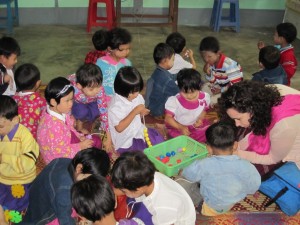 Philip’s mother was displaying blind faith — the kind blind faith that Jesus rebukes Thomas for not displaying. At least – that is what it sounded like when I first heard the story. This woman handed her child over to a near stranger to take him to a foreign land with the hope for a better life. How many of us could do the same thing? But, then again, how many of us are living under oppressive rule with no hope to get out? The more I have considered Philip’s story the more I realize that while some of Philip’s mother’s trust was blind – much of it was informed by the reality she was experiencing. Some of it was an incredible – unthinkable, really – extension of faith in another person… but that extension of faith was calculated in some ways.
Philip’s mother was displaying blind faith — the kind blind faith that Jesus rebukes Thomas for not displaying. At least – that is what it sounded like when I first heard the story. This woman handed her child over to a near stranger to take him to a foreign land with the hope for a better life. How many of us could do the same thing? But, then again, how many of us are living under oppressive rule with no hope to get out? The more I have considered Philip’s story the more I realize that while some of Philip’s mother’s trust was blind – much of it was informed by the reality she was experiencing. Some of it was an incredible – unthinkable, really – extension of faith in another person… but that extension of faith was calculated in some ways. 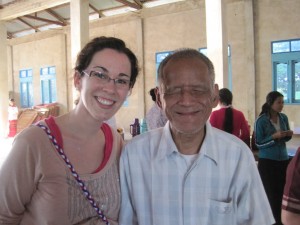 Philip arrived in Boston and was enrolled in the Perkins School for the Blind. Philip completed the equivalent of his high school studies in 2 years and so his missionary benefactor helped him apply to Boston University, where he completed his BS in education to become a teacher – again in only 2 years. Since he still had a year left on his student visa, Philip then got a job at a piano tuning shop in Somerville and he learned the trade of piano tuning. After five years in Massachusetts Philip returned to Myanmar, despite being offered asylum in the US, to share the knowledge he had obtained in his time away. I was enthralled by Philip’s story. I asked him, what the hardest part of growing up blind was for him and he said, “I can’t think of a hardest part of being blind. A hardest part of life, yes; but of being blind… it is all I know. Sighted people always assume the darkness must trouble me but I don’t think I have experienced darkness. I know what colors and light must look like because my friends have taken such care to explain those things to me; but darkness has been described as the ‘absence of colors and light’ and I cannot fathom what that would be like because, by the grace of God, my whole life has been filled with color and light.”
Philip arrived in Boston and was enrolled in the Perkins School for the Blind. Philip completed the equivalent of his high school studies in 2 years and so his missionary benefactor helped him apply to Boston University, where he completed his BS in education to become a teacher – again in only 2 years. Since he still had a year left on his student visa, Philip then got a job at a piano tuning shop in Somerville and he learned the trade of piano tuning. After five years in Massachusetts Philip returned to Myanmar, despite being offered asylum in the US, to share the knowledge he had obtained in his time away. I was enthralled by Philip’s story. I asked him, what the hardest part of growing up blind was for him and he said, “I can’t think of a hardest part of being blind. A hardest part of life, yes; but of being blind… it is all I know. Sighted people always assume the darkness must trouble me but I don’t think I have experienced darkness. I know what colors and light must look like because my friends have taken such care to explain those things to me; but darkness has been described as the ‘absence of colors and light’ and I cannot fathom what that would be like because, by the grace of God, my whole life has been filled with color and light.”
I have been contemplating recently the idea that many atheists call themselves “free thinkers” and the implied statement that makes against those who believe in God. For me, nothing seems less free than the idea that you can believe anything you want, as long as God is not one of the things you chose to believe. To be clear, I understand that the origin of the “free-thinker” moniker comes from 17th century philosophy and truly means that the subscribers form all of their belief structure around the tenants of reason and logic. I understand what they are trying to say; but I must say that reason and logic are very much involved in my faith in Jesus Christ. I do not check my brain at the door nor do I ask anyone else to do so. I do not pass judgement on those who believe differently than I do; but I do ask that the favor of acceptance be reciprocated. I am free to think that there is a god just as I am free to think there is not. I am free to love as I have been loved just as I am free to turn a cold shoulder. I am free to live into my full potential just as I am free to squander the gifts I have been given. I am free to do all of these things and more because of the Grace and Love afforded me by God who is Mother and Father to us all. I am a free thinker because of the Free Will God gave to humanity. And, in my estimation, the freedom to truly use all of my faculties to discover truth, both objective and subjective truth, is the only way one can truly be a freethinker.
My lenten discipline has been a challenge at best. I promised myself that I will leave my apartment, once a week, for a non-work-related experience where I could potentially make friends. I will do this on my own so I am forced to talk to new people. I have failed at this. Each week comes and goes and I find a reason why staying home is preferable. (I am a homebody… I can’t help it.)
So, a few weeks ago I bought a ticket to what I thought was an Irish fiddling concert at my favorite local Irish pub. Good frugal New Englander than I am, I knew if I spent $27 I wasn’t about to bail on it!!! So I spent the money on a single, will-call ticket and let it be. Little did I know: this was to be the longest week of my priesthood thus far. I left work tired — bone tired. The kind of tired one is when she would rather hibernate for a season than go to a pub and pretend to be extroverted. But I still went…
I arrived to discover that this Irish pub reserved my ticket under a misspelled, Brit-ruined, no O nor apostrophe version of my name… strike one. Then I learned the show was not a fiddle concert it was a play about fiddlers… strike two! Finally, the show started and I saw that only one man, in the band, played the fiddle! The actors were badly pantomiming to his playing. I tried to like the play, but I just couldn’t. It wasn’t at all what I’d hoped for. Feeling sad and dejected I paid my tab and walked into the bitter cold night during intermission. As I walked towards my car, trying to convince myself that just going out was a success, I ran into a lost woman about my age. She asked for directions to a particular bus only for me to tell her that she was walking in the wrong direction. I felt so bad: it is freezing cold with a bitter wind tonight, and this poor girl who I assumed was from away, was set to walk home.
In that moment I took a chance we are told not to take in this day and age: I asked, “Would you like a ride?” We both laughed. I explained that I was just heading home to walk my dog and I really didn’t mind. She laughed and contemplated this abnormal offer and finally said, “You don’t seem crazy.”I assured her I wasn’t crazy and off we went to my car. I told her that I am a priest to which she replied that she is Jewish. We had a good, comical conversation spurred on by the fact that neither of us have been in such a situation before. I drove her to her friend’s house and learned that she is, in fact, visiting town. We laughed and smiled. She offered a hug when I dropped her off. I drove home with a huge smile across my face. Our interaction was healing and Spirit filled.
When I left the pub I felt like a failure. I felt like I shouldn’t bother trying to meet new folks because it always seems to be a comedy of errors (did I mention the creepy man who kept trying to get my number until he asked what I do for a living?) But on the sidewalk, a chance interaction, redeemed the night. Ruach is present all around us… we must simply be open to Her fanciful dance.
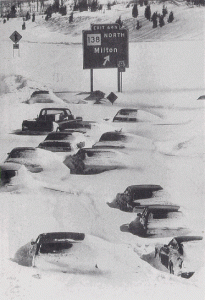 On February 6th and 7th 1978 a monster blizzard rocked the northeastern United States dropping over 30 inches of snow and paralyzing the region for days. When the morning of the forecasted storm dawned with no snow people thought the meteorologists had once again gotten the forecast wrong and they went about their day. People went to work and school, thousands of people filled the Boston Garden for a Bruins game and Monday, February 6th seemed to be just like any other day. But people soon learned that it was not like any other day. Hundreds of cars were abandoned in roadways because the snow came so quickly. Plow trucks were overwhelmed and likewise had to be abandoned. Hundreds of hockey fans camped out in the Garden for days because they couldn’t get home. Everyone has a story about where they were when the blizzard hit because it was a once in a lifetime storm. Life came to a screeching halt because there was no other choice: All of New England was frozen in time.
On February 6th and 7th 1978 a monster blizzard rocked the northeastern United States dropping over 30 inches of snow and paralyzing the region for days. When the morning of the forecasted storm dawned with no snow people thought the meteorologists had once again gotten the forecast wrong and they went about their day. People went to work and school, thousands of people filled the Boston Garden for a Bruins game and Monday, February 6th seemed to be just like any other day. But people soon learned that it was not like any other day. Hundreds of cars were abandoned in roadways because the snow came so quickly. Plow trucks were overwhelmed and likewise had to be abandoned. Hundreds of hockey fans camped out in the Garden for days because they couldn’t get home. Everyone has a story about where they were when the blizzard hit because it was a once in a lifetime storm. Life came to a screeching halt because there was no other choice: All of New England was frozen in time. 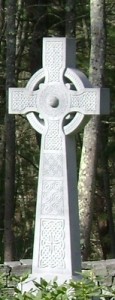 A few years ago at my childhood church they were putting the finishing touches on the column barium and memorial garden that had been years in the making. The last piece was an 8-foot high Celtic cross carved from limestone that was to be mounted on a pillar in the center of the space. When the planning committee contacted the artisan who was to carve the cross they asked if he would be willing to intentionally make a small mistake in the knot work. Traditional Celtic knots always include a mistake as an acknowledgement that God is the only true perfection. Making a mistake in the knot is recognizing our utter dependence on God because of our imperfect nature. The artist refused at first. After some coaxing, he agreed to carve the mistake only if the cross was mounted with the mistake facing the forest so that people examining pictures of his portfolio would not see it. On that spring afternoon as the crane lowered the heavy cross into place the head of the planning committee changed her mind. She stopped the crane operator and had him turn the cross around so that the mistake was facing forward. She wrote a note to the artist explaining what she had done and the theological reasoning behind it. You see, we must not be ashamed of our brokenness and imperfections because it is through that brokenness we find the strength to rely upon God.
A few years ago at my childhood church they were putting the finishing touches on the column barium and memorial garden that had been years in the making. The last piece was an 8-foot high Celtic cross carved from limestone that was to be mounted on a pillar in the center of the space. When the planning committee contacted the artisan who was to carve the cross they asked if he would be willing to intentionally make a small mistake in the knot work. Traditional Celtic knots always include a mistake as an acknowledgement that God is the only true perfection. Making a mistake in the knot is recognizing our utter dependence on God because of our imperfect nature. The artist refused at first. After some coaxing, he agreed to carve the mistake only if the cross was mounted with the mistake facing the forest so that people examining pictures of his portfolio would not see it. On that spring afternoon as the crane lowered the heavy cross into place the head of the planning committee changed her mind. She stopped the crane operator and had him turn the cross around so that the mistake was facing forward. She wrote a note to the artist explaining what she had done and the theological reasoning behind it. You see, we must not be ashamed of our brokenness and imperfections because it is through that brokenness we find the strength to rely upon God.
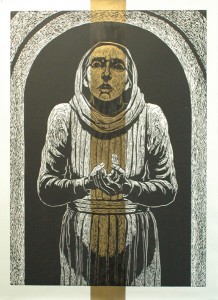 |
| “Here I Am” by Margaret Adams Parker |
———
Several years ago there was a television series called, “Kids say the darndest things.” The premise of the show was that the host would interview children and simply record their candid answers to the questions posed. The entire program was just a half hour of the host interviewing children about their lives and waiting for them to say funny things. If you’ve ever been around children than you know that you never had to wait very long before the children would say something outlandish causing the live studio audience to burst into laughter. This is why the expression “out of the mouths of babes” exists: Children are utterly honest. Children are a mirror we hold up to the world to see its truest reflection. But children are also among the most vulnerable in our world. Children are not inherently in a position of power; they need caring adults to ensure their safety and to listen to them. When children are in the most danger is when they are living in a situation where their voices cannot be heard.
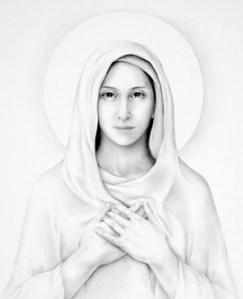
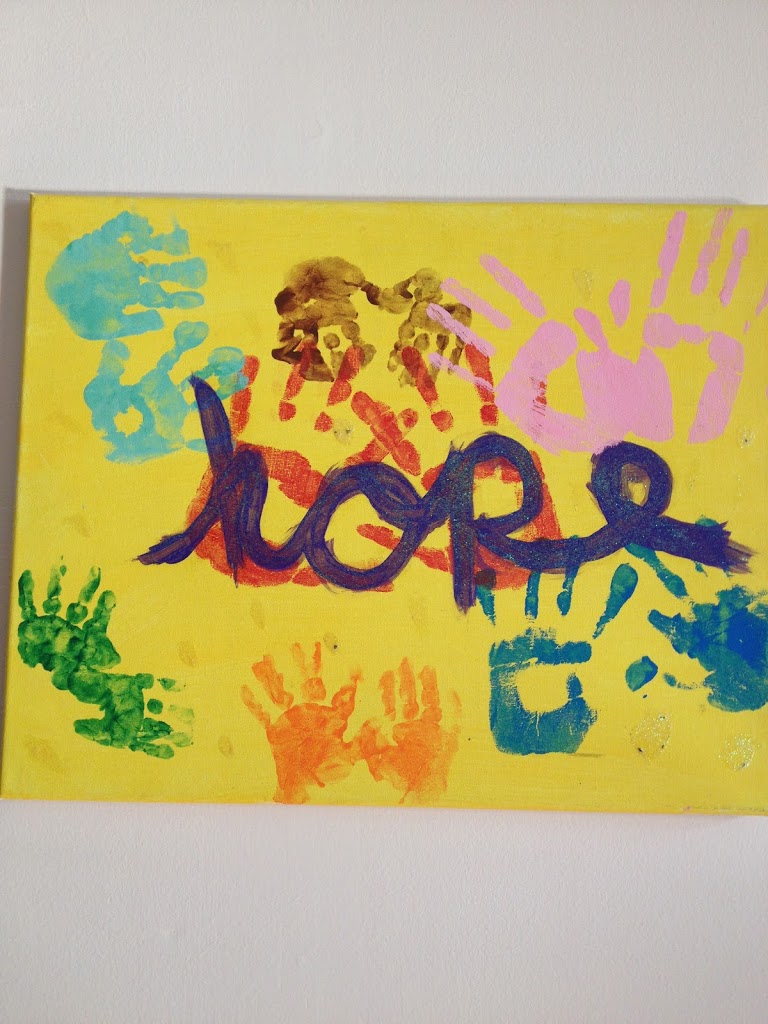
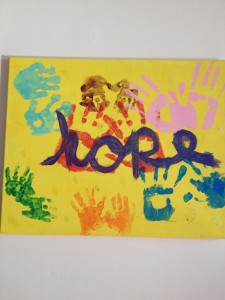

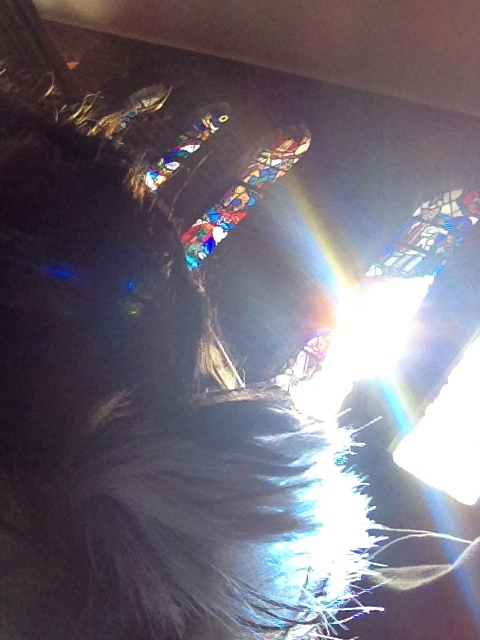
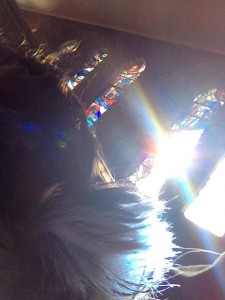



Recent Comments